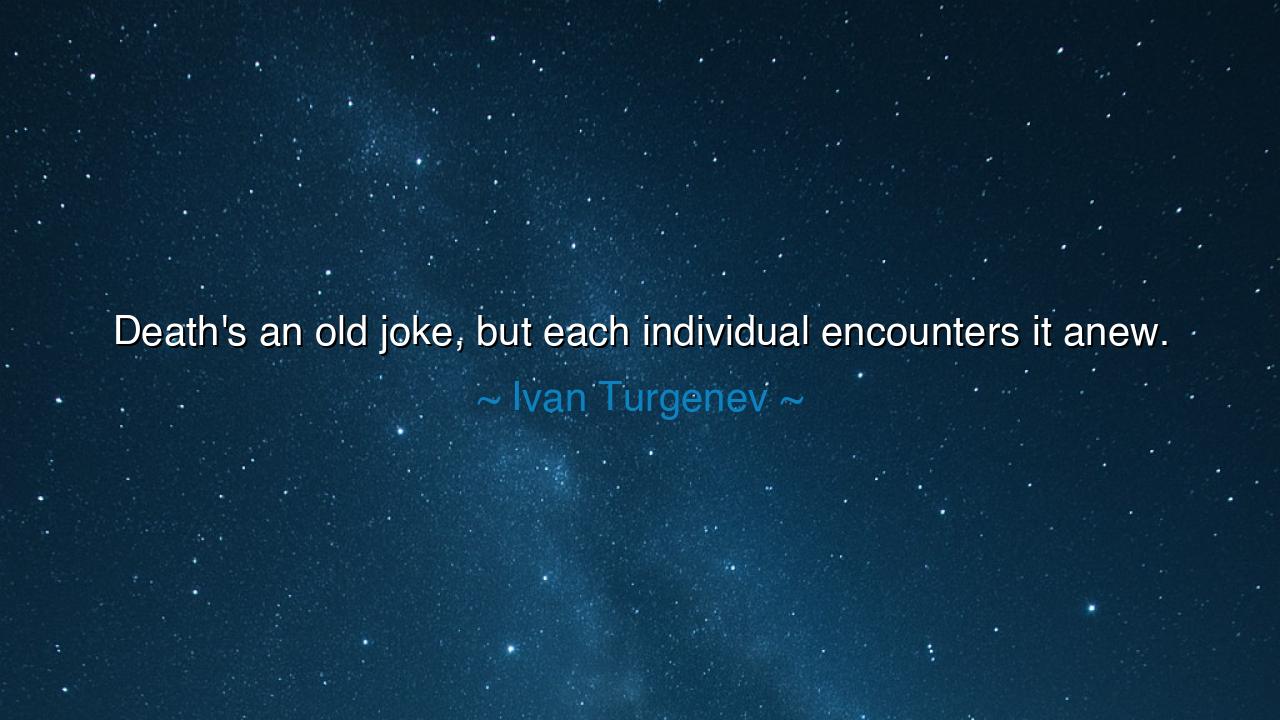
Death's an old joke, but each individual encounters it anew.






“Death’s an old joke, but each individual encounters it anew.” Thus wrote Ivan Turgenev, the great Russian novelist and philosopher of the soul, whose works trembled with both tenderness and truth. In this short and haunting phrase, he reveals the paradox that all humankind shares: though death is as ancient as life itself, every soul must face it as if for the first time. It is the oldest of all certainties, yet it comes to each of us as a mystery, fresh and personal. The generations before us have met it and vanished into silence, and yet when it comes to us, it feels like a secret spoken only to our own heart.
The origin of this quote lies in Turgenev’s lifelong meditation on the nature of mortality and the human spirit. Living in the shadow of Russia’s social upheavals and personal loss, he was no stranger to the nearness of death. He witnessed revolutions of the body and of the soul, and he understood that death — though ever present — never becomes ordinary. To call it an “old joke” is not to mock it, but to acknowledge its universality, its inevitability, its grim familiarity to all who live. But to say that “each individual encounters it anew” is to honor the uniqueness of every human consciousness — that what is old to the universe is still new to the heart that meets it for the first time.
In these words, Turgenev speaks both as philosopher and poet. The ancients, too, wrestled with this truth. Socrates, on the eve of his execution, told his disciples that death is either a dreamless sleep or the beginning of a new journey. To him, the fear of death was folly, for all men must face it — yet for each, it is a private voyage, unlike any that came before. Even if death itself has been repeated since the dawn of time, its meaning is always personal, always singular. To die is to step beyond the shared world and into a silence no one else can enter with us.
Consider the story of Marcus Aurelius, emperor and philosopher, who ruled the greatest empire on earth yet meditated nightly on the fleeting nature of life. Surrounded by wealth, power, and soldiers, he reminded himself: “You could leave life right now. Let that determine what you do and say and think.” To Marcus, death was a companion — familiar, expected — but never dull. Each day, he met it in thought as one would greet an old friend, preparing for their final encounter. His calm acceptance did not make death less profound; rather, it made life more meaningful. He understood, as Turgenev did, that awareness of death renews the soul’s reverence for living.
There is a strange mercy in this truth. If death were not constantly renewed in our awareness, if it were truly an old and empty thing, life itself would lose its wonder. The knowledge that every breath may be our last transforms the simplest act — a word spoken in kindness, a glance toward the sky — into something sacred. Turgenev’s “old joke” is life’s greatest teacher: a jest so ancient it has worn through tragedy and returned as wisdom. It laughs not at us, but with us, reminding us that even in our mortality, there is continuity — that though we perish, life itself goes on, eternal and ever reborn.
To meet death anew is also to meet life anew. For when one truly sees the nearness of the end, the heart begins to perceive beauty in every passing hour. The flower blooms more brightly, the faces of loved ones glow more dearly, and the noise of the world fades into the quiet music of being. Thus, death — though feared — becomes the mirror through which life reveals its meaning. The one who learns to look into that mirror without trembling begins to understand what it means to live without regret.
So, my listener, take this teaching to heart: do not fear death, but let it teach you how to live. Remember that every day is both a gift and a countdown, a chance to create something worthy of remembrance. Do not hide from the thought of your end — embrace it, for it will sharpen your love for the present moment. Live so that when death comes, it finds you not cowering, but standing — peaceful, grateful, unafraid. For though death may be an old joke, the life you live before it is forever new. And when your time comes to encounter it, may you meet it not as a stranger, but as an old friend waiting to welcome you home.






AAdministratorAdministrator
Welcome, honored guests. Please leave a comment, we will respond soon